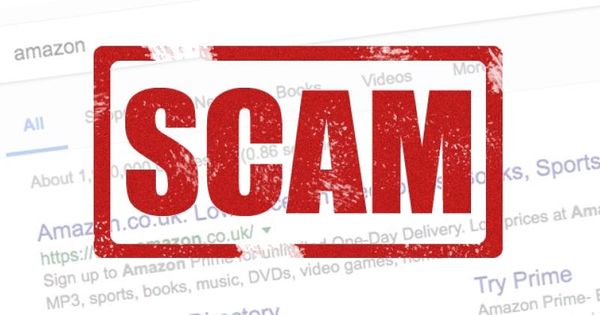Google search results are falling foul of scammers spoofing well-known sites

Hopefully by now we all know that the adverts which pepper webpages can be malicious.
That growing threat has driven an ever-increasing use of ad blockers amongst users who aren’t trying to prevent legitimate sites from earning a crust through advertising, but are simply sick of finding their computers under attack from poisoned adverts trying to plant malware or advertisers creepily tracking their movements across the web.
With both malvertising and ad blocking on the rise, it’s clear that some pretty big companies are going to feel the pinch. And none, perhaps, more obviously than Google.
You see, most people when they think of Google think of it as a search engine. However, that isn’t Google’s core business. Search isn’t what makes Google huge amounts of money every year. No, Google is an advertising company.
They lure you in with an (admittedly terrific) search engine, so they can inject context-sensitive ads in the search results. The advertisers know that Google is one of the most heavily trafficked websites on the internet, and that Google knows an awful lot about what its users are interested in at that particular moment.
Ad blockers aren’t good for Google’s business model. And neither is malvertising.
Because the more malicious ads pester users (whether on Google’s own site or elsewhere on the web), the more users will install ad blockers.
As Google itself says, “malvertising poses a very serious threat to the entire online community.” Google is including itself in that statement.
But I shouldn’t be too cynical. Because Google’s fight against malvertising helps all of us. Last year, the firm took down a jaw-dropping 1.7 billion adverts that violated its advertising policies.
Which makes it all the more surprising to hear that online fraudsters managed to waltz past Google’s vetting and successfully plant a rogue ad for the world’s most searched for retail store: Amazon.
As ZDNet reports, someone managed to place a convincing-looking ad that appeared above the search results for users Googling for Amazon:
The good news is that unlike other rogue ads, your machine wasn’t infected or served malware in any way.
But anyone who clicked on it would not have been sent to Amazon.com as they would have hoped, but instead, they were pointed to a fake Windows support scam posing as Microsoft.
From there, scammers would have tried to trick the user into calling a number for fear that their computer was in fact infected with malware.
Mac users don’t get escape unscathed either. Obviously a Microsoft tech support scam was unlikely to dupe the typical Apple fan, and so they get their own customised scam alert:
Sadly, this isn’t an isolate incident.
For instance, last month a Canadian malware analyst called Aura warned how a Google ad for YouTube (YouTube, you should remember, is part of the Google empire) actually took users to a Microsoft tech support scam site.
If Google can’t police ads for sites it itself owns like YouTube, then you have to question how capable they are to police adverts to the many millions of other websites on the net.
If you find a malicious ad or webpage, be sure to report it so it can be cleaned up as quickly as possible.
tags
Author
Graham Cluley is an award-winning security blogger, researcher and public speaker. He has been working in the computer security industry since the early 1990s.
View all postsRight now Top posts
Start Cyber Resilience and Don’t Be an April Fool This Spring and Beyond
April 01, 2024
Spam trends of the week: Cybercrooks phish for QuickBooks, American Express and banking accounts
November 28, 2023
FOLLOW US ON SOCIAL MEDIA
You might also like
Bookmarks











